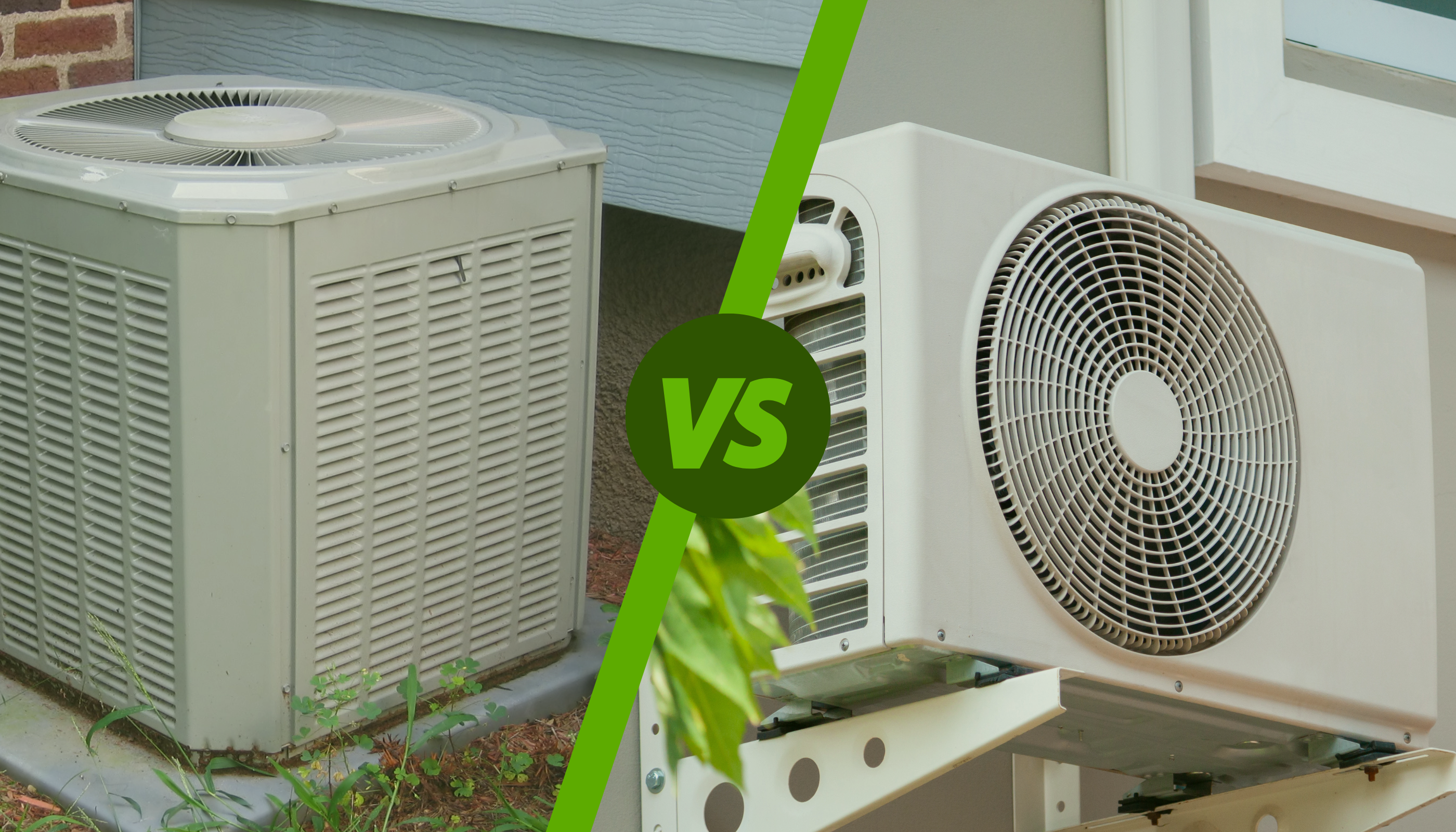
Summers are getting hotter, and it’s more important than ever to ensure you have a reliable cooling system. There are two main options to choose from for home cooling: heat pumps and conventional air conditioning. Conventional ACs have been the go-to for decades, but heat pumps are quickly overtaking them thanks to the enhanced benefits they offer.
In this guide, we compare heat pumps vs AC in terms of their capabilities, energy efficiency, installation costs, longevity, and more to help you decide which cooling system is right for your home.
AC vs Heat Pumps: What’s the Difference?
First things first—what’s the difference between an air conditioner and a heat pump?
How an Air Conditioner Works
Air conditioners are electric appliances that use refrigerant to remove heat and humidity from the air inside your home while pushing cool air in to replace it.
Types of Air Conditioners
There are two main types of air conditioners: central ACs and window air conditioners. Central air conditioners connect to your central ductwork and can cool your entire home. Window ACs can only keep one room or area cool.
How a Heat Pump Works
Heat pumps are similar to air conditioners and they work almost the same way, but with one major difference—heat pumps can heat and cool. In cooling mode, a heat pump removes heat and humidity from the air inside your home the same way an AC does. But it can also reverse the process. In heating mode, a heat pump extracts heat from the air outside, raises the temperature, and brings it into your home.
Types of Heat Pumps
There are two types of air-source heat pumps, ducted and ductless. Ducted heat pumps connect to your ductwork, like a central heating and cooling system. Ductless heat pumps are installed directly in the rooms where they’re needed and a small hole is drilled through an exterior wall to connect the wiring to the outdoor unit. Multiple indoor units can be connected to one outdoor unit.
Heat Pump vs AC: How They Compare
Capabilities
As we’ve mentioned, air conditioners can only cool while heat pumps can heat and cool. With a heat pump, you’re getting both an air conditioner and a heating system in one. If you need to replace your AC now and know your furnace is getting old too, installing a heat pump is likely the best choice. When your furnace dies, you will already have a new heating system in place, saving you the hassle and cost of a second HVAC replacement.
Energy Efficiency
Heat pumps and air conditioners can both be energy efficient, depending on the model you install. A rating system, called Seasonal Energy Efficiency Ratio (SEER), is used to describe how energy efficient a heat pump or air conditioner is. A heat pump and air conditioner with the same SEER rating will be equally energy efficient in cooling mode. But heat pumps can also heat and are more energy efficient than many other types of heating systems. They’re also much more efficient than window and portable ACs. So, depending on your current heating and cooling system, installing a heat pump could improve your home’s energy efficiency and save you money on your energy bills.
Installation Costs
Generally speaking, heat pumps are more expensive than air conditioners. But heat pumps provide benefits that air conditioners do not. Plus, they qualify for rebates and incentives.
- Heat pumps are eligible for a $2,000 federal tax credit.
- There are also local Maryland heat pump rebates available, including up to $10,000 (or 75% of project costs) from the BGE Smart Energy Savers Program.
Call Total Home Performance with questions about heat pump rebates—we can help you find out what savings you’re eligible for.
Longevity
Central heat pumps and central air conditioners have similar lifespans. A well-maintained heat pump should last for at least 15 years and a well-maintained central air conditioner will have around 10-15 good years in it. But longevity depends on the model, frequency of use, maintenance, and your home’s overall energy efficiency. Insulating and air sealing your house, for example, makes it easier for your cooling system to do its job, which can reduce stress and extend your HVAC system’s lifespan.
Fossil Fuel Consumption
If you install a heat pump, you can replace both your heating and cooling systems with an all-electric appliance. That means eliminating fossil fuels from your home. A fossil-fuel-free house is better for the environment, and it’s also healthier for your family. If you install an air conditioner, you will have to rely on a furnace or boiler that burns fossil fuel for heat.
The Final Verdict: Heat Pumps Come Out on Top
At Total Home Performance, we believe a heat pump is the best choice. Heat pumps are an energy efficient, environmentally friendly option for home heating and air conditioning that keep fossil fuels out of your house. They qualify for rebates to reduce installation costs and could potentially save you money on your energy bills. Interested? Give us a call to learn more. We install high-efficiency heat pumps in the Eastern Shore, Delaware, and Anne Arundel County areas.